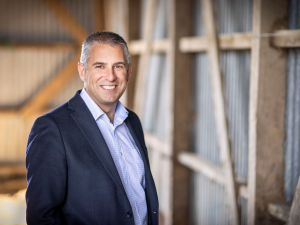Another record milk price for Tatua suppliers
Independent Waikato milk processor Tatua has set another new record for conventional farmgate milk price paid to New Zealand farmers.
 Tatua chief executive Brendhan Greaney says the co-op isn't keen to compare payouts with other processors.
Tatua chief executive Brendhan Greaney says the co-op isn't keen to compare payouts with other processors.
Small Waikato milk processor Tatua isn't blowing its own trumpet after blitzing other processors in the milk payout battle last season.
The co-operative is remaining modest despite paying $1.50/kgMS more to its farmer shareholders than Fonterra.
Tatua chief executive Brendhan Greaney told Dairy News that the co-op isn't keen to compare payouts.
"We are pleased with the result as being reflective of a well-rounded performance in another challenging year," he says.
"We are reluctant to compare our payout with others given there is such a range of business models, ownership structures and supplier entry costs - but nevertheless, we know we have achieved a good result for our shareholders."
Tatua announced a record payout of $10.43/kgMS before retentions for the 2020-21 season. The co-op retains $1.18/kgMS for reinvestment meaning its farmer shareholders get a cash payout of $9.25/kgMS. Fonterra last month announced a final payout of $7.74; milk price of $7.50 and 20c dividend. Synlait announced an average payout of $7.82/kgMS for last season - made up of a base milk price of $7.55 and incentive payment of 27c.
Tatua's 106 shareholder-owned farms had their second highest milk production season on record, supplying 15.65 million kgMS, 3.3% ahead of the previous year.
Greaney says the payout has been well received by farmer shareholders.
"We've had some very positive feedback - including broad support for retaining some earnings for reinvestment and maintaining a strong balance sheet."
The co-op has retained $18m for reinvestment to improve production capability and sustainability-related projects.
"We do have a reasonably weighty capital program planned for the year, including projects with a sustainability focus, as well as others to increase our capacity and capability in the manufacture of our specialist or value-add products," says Greaney.
In deciding the final payout, Greaney says Tatua sought to balance the needs of shareholder's farming businesses with the requirement for continued investment in the business to support longer-term sustainability, and "a sensible level" level of debt.
The co-op's gearing (debt divided by debt plus equity) averaged 20.5% last year, which was lower than the previous year average.
"We have deliberately reduced our debt levels over the last few years to be in apposition that we now think is about right for the environment we are in," adds Greaney.
He paid tribute to the co-op's workforce, both here and overseas.
"Our people have once again shown real dedication and commitment toward the business through another challenging year. Our financial performance and everything that has been achieved is the reflection of the collaboration and collective efforts of everyone."
Federated Farmers is celebrating following the Government's announcement that young farmers will be able to use their KiwiSaver funds to buy their first home or farm.
The Meat Industry Association of New Zealand (MIA) today announced that Chief Executive Officer Sirma Karapeeva has resigned from the role.
The winners of the 2026 Hawke’s Bay/Wairarapa Dairy Industry Awards were announced at the annual awards dinner held at Copthorne Solway Park in Masterton on Thursday evening.
Environment Southland is welcoming this week’s decision by the Environmental Protection Authority (EPA) to approve the release of Blaptea elguetai, a leaf‑feeding beetle that will help control the highly invasive Chilean flame creeper.
This March, the potato industry is proudly celebrating International Women’s Day on 8 March alongside the International Year of the Woman Farmer, recognising the vital role women play across every part of the sector — from paddocks and packhouses to research, leadership, and innovation.
Fruit trader Seeka posted a record profit and returns to shareholders in 2025.
OPINION: Staying with politics, with less than nine months to go before the general elections, there’s confusion in the Labour…
OPINION: Winston Peters' tirade against the free trade deal stitched with India may not be all political posturing by the…